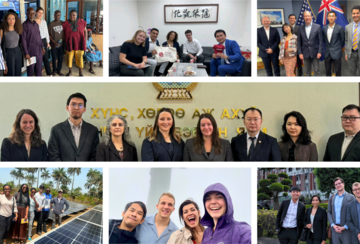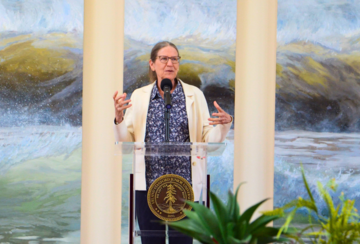
Each spring, second year students in the Ford Dorsey Master's in International Policy spread out across the globe to work on projects affecting communities from Sierra Leone to Mongolia, New Zealand, and beyond.
A new Stanford Internet Observatory report examines how to improve the CyberTipline pipeline from dozens of interviews with tech companies, law enforcement and the nonprofit that runs the U.S. online child abuse reporting system.

Artwork by artist Sukey Bryan highlights the importance of interdisciplinary approaches to addressing complex issues like climate change.
Sherri Rose joins global network of health experts to improve the transparency and accuracy of prediction models.

According to Eugene Finkel, the Kenneth H. Keller Associate Professor of International Affairs at Johns Hopkins University, Russia’s recurrent attacks against Ukraine can be traced to issues of identity and security.

Gombojavyn Zandanshatar, Chairman of the State Great Khural (the Parliament of Mongolia) and a former CDDRL visiting scholar, reports that a second National Deliberative Poll in his country has successfully led to a new Constitutional Amendment.
Stanford students got hands-on with Korean cuisine in cooking classes with celebrity chefs Judy Joo and Ryu Soo-young. Hosted by the Korea Program at Shorenstein APARC, the classes followed the conference “Korean Cuisine Gone Global.”
The annual award from the National Institute for Health Care Management Foundation recognizes the contributions of researchers and journalists who examine new evidence that advances the health system and the health of Americans.

Shorenstein Postdoctoral Fellow Norman Joshua examines how state-society interactions in Indonesia produced an authoritarian political culture, tracing the implications of the country’s enduring legacy of militarization.

Nobel Peace Prize winner and CDDRL alumna Oleksandra Matviichuk delivered the S.T. Lee Lecture on April 15 and spoke of the broader implications of Russia’s actions in Ukraine and for the world if the West does not continue to support Ukraine in its fight against Russia.

The Parliament of Mongolia is convening the Trans-Altai Sustainability Dialogue on April 25-26, 2024, along with Stanford University’s Walter H. Shorenstein Asia-Pacific Research Center and the Ban Ki-moon Foundation For a Better Future as co-hosts. The forum will bring together experts across academia, civil society, and government from the United States and Asia to share policy pathways and best practices to strengthen the capacity of institutions to achieve the targets for Sustainable Development Goal 16 of the 2030 Agenda for Sustainable Development.

Beatriz Magaloni, the Graham H. Stuart Professor of International Relations, presented her latest research during a CDDRL seminar talk.
Researchers “spill the tea” on why gossiping may promote social cooperation.
![[Left to Right] Dorit Banet, Galit Cohen, Tareq Abu Hamed, Victor Weiss](https://fsi9-prod.s3.us-west-1.amazonaws.com/s3fs-public/styles/360x244/public/2024-04/israel_environment_3-8_hero.png?h=c4d9845d&itok=KQqkxsw3)
Environmental experts examined the challenge of sustainable restoration and preserving environmental quality for the future of Gazans and residents of the region in the wake of the Israel-Hamas War.

Following the disappointing performance of South Korea’s ruling People Power Party in the April 10 parliamentary elections, Stanford sociologist and APARC Director Gi-Wook Shin analyzes the implications of the election outcomes for President Yoon’s domestic and foreign policies and Korean society and economy.
Talking about other people behind their backs can be an important way of encouraging cooperation, according to a new theoretical model.

Lisa Blaydes, Stanford Professor of Political Science and FSI Senior Fellow, explains how regime policies in Kuwait have helped longstanding elite families maintain their social prestige in the contemporary era.
In a new study by members of Josh Salomon's Prevention Policy Modeling Lab, the researchers found profound racial and ethnic disparities that are stalling overall progress against TB.
The report, "U.S.-China Scholarly Recoupling: Advancing Mutual Understanding in an Era of Intense Rivalry", is a compilation of 27 essays, contributed by American and Chinese scholars from a wide range of disciplines, that explain the benefits of U.S.-China scholarly cooperation to the two societies and the world at large, identify the obstacles to greater exchanges, and outline practical strategies for overcoming these challenges.

A multinational Deliberative Poll unveils the global public's nuanced views on AI chatbots and their integration into society.
We are thrilled to welcome fourteen outstanding students, who together represent fourteen different majors and minors and hail from eight different states and two countries, to our Fisher Family Honors Program in Democracy, Development and the Rule of Law.

The award celebrates individuals who have demonstrated exceptional dedication and impact in advancing social equity, championed the cause of social justice, and inspired meaningful change in their communities.

Honoring the Legacy of Makoto Iokibe
Honoring the Legacy of Makoto Iokibe
Makoto Iokibe was an esteemed diplomatic historian best known for his pioneering studies on the U.S. post-World War II occupation of Japan, but his influence extended beyond the scholarly world.














